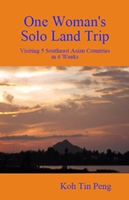If you ask 10 people if they love travelling, 8 or 9 out of 10 would tell you that they do, and they wish they have more time and financial resources to be able to travel more often.
Why do people love to travel? It’s because as humans, we crave for new experiences and want something different from our routine life. Travel fulfills living a beautiful life, allows one to explore the unfamiliar and discover new places and make new friends. Of course, when travelling, sometimes you also experience unexpected events that might cause some unpleasantness or anxiety.
During my recent travel to Japan, I experienced two natural disasters – typhoon and earthquake.
I had no idea what a typhoon is like as in Singapore, we don’t experience typhoon. I had thought that it was just an exceptionally heavy downpour while I was in Tokyo. Only when I was back in the hostel in the evening and watched the news did I realise the severity of the event. I was lucky that Tokyo didn’t experience any severe damage, but some perfectures north of Tokyo were not so fortunate. Heavy flooding, houses being washed away and lives lost. Although intellectually I understand the destructive effects of a typhoon from news reports, it is when you have experienced a typhoon first hand that you know how destructive it could be. I was fortunate that I had only been caught in the heavy downpour caused by the typhoon and not experienced the full-blown effects of one.
The other experience was an earthquake when I was in Kamakura (鎌倉), Kanagawa Prefecture. Although Singapore is not situated in an earthquake zone, some parts of Singapore might experience earth tremors when there is an earthquake in Indonesia. In 2007, I had my first earthquake experience when an earthquake struck in Sumatra, Indonesia, while I was working in the Central Business District. I didn’t know it was an earthquake as I had no prior experience and thought the shaking movement to the table was caused by my colleague sitting next to me. This one in Japan was caused by a earthquake in Tokyo Bay and it was on Richter Scale 5.4. I could feel the huge shaking movement in Kamakura, even when the town is about 65 km away from Tokyo Bay (the epicentre). I was already awoken lying on my hostel futon although it was only around 6:00 am. When we experienced the earthquake, all my roommates sat up. Many of them were Japanese and I noticed that they were all calm, sitting down and waiting for the tremors to die down. I didn’t feel I was in danger as I was staying in a 2-storey hostel. After the tremors subsided, all the Japanese roommates went online to check if there was any tsunami alert. I also did so and was amazed that within a few minutes, the Japan Meteorological Agency (JMA) has updated their website about the timing, epicentre and magnitude of the earthquake and advised that there was no risk of tsunami.
Before this trip, although I know Japan is a country prone to earthquakes, I have not thought that I would experience one during my trip. Today, I went to the JMA website again and was surprised to see that Japan experiences earthquake often. The most recent earthquakes happened on 4 October to 6 October and it was on the scale of 3.3 to 4.9. This could explain why the Japanese are calm and collected when experiencing an earthquake, as it is common for them and they know what they should do in the event of an earthquake.
Of course, we do not wish for disasters to happen but natural disasters are not within our control, and we should learn to be prepared for it. From this incident, I learn from the Japanese to stay calm and act appropriately when encountering natural disaster.
But does natural disaster truly happen naturally? This question has not been in my mind before until some weeks ago, when I was taken aback after reading an magazine article about how damming might have caused more seismic activity resulting in earthquakes. Some scientists believe that the Sichuan earthquake in 2008 which killed 80,000 people might have been caused by the construction of the Zipingpu Dam. It made me rethink if we humans might have played a bigger role than we thought in causing natural disasters, just like we have contributed to the depletion of the ozone layer by using products that release cholorofluorocarbons (CFCs) and global warming by increasing the production of greenhouse gases.
In another article I found online by “Probe International”, it mentions that damming where huge reservoirs are created might be the cause of more earthquakes because of the built up water pressure, in a phenomenon called “Reservoir-induced Seismicity (RIS)”. For those who are interested to know more about this topic, read “A Chinese Study reveals Three Gorges Dam triggered 3.000 earthquakes, numerous landslides”.
How we humans could have caused earthquakes is not related to the topic of travel but nevertheless an important discovery I have made when browsing through magazines that I don’t usually read. This is why it is always good to explore the unfamiliar, whether is it experience, place, reading materials or talking to other people.


